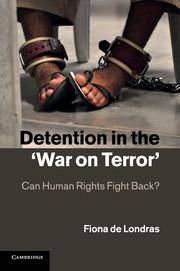Detention in the 'War on Terror': Can Human Rights Fight Back?
Fiona de Londras
Éditeur : CAMBRIDGE UNIVERSITY PRESS
ISBN papier: 9781107538153
Parution : 2015
Code produit : 1307705
Catégorisation :
Livres /
Droit et sciences juridiques /
Droit et sciences juridiques /
Droit de la personne
Formats disponibles
| Format | Qté. disp. | Prix* | Commander |
|---|---|---|---|
| Livre papier | En rupture de stock** |
Prix membre : 41,58 $ Prix non-membre : 43,77 $ |
*Les prix sont en dollars canadien. Taxes et frais de livraison en sus.
**Ce produits est en rupture de stock mais sera expédié dès qu'ils sera disponible.
Description
In this book, Fiona de Londras presents an overview of counter-terrorist detention in the US and the UK and the attempts by both states to achieve a downward recalibration of international human rights standards as they apply in an emergency. Arguing that the design and implementation of this policy has been greatly influenced by both popular and manufactured panic, Detention in the 'War on Terror' addresses counter-terrorist detention through an original analytic framework. In contrast to domestic law in the US and UK, de Londras argues that international human rights law has generally resisted the challenge to the right to be free from arbitrary detention, largely because of its relative insulation from counter-terrorist panic. She argues that this resilience gradually emboldened superior courts in the US and UK to resist repressive detention laws and policies and insist upon greater rights-protection for suspected terrorists. • Provides a comparative and critical account of executive, legislative and judicial approaches to counter-terrorism in the US and the UK • Explores the role of panic in counter-terrorist decision-making and considers its influence in facilitating the introduction of repressive detention policies • Advances a theory of the normative resilience of international human rights law and its significance in domestic judicial proceedings























